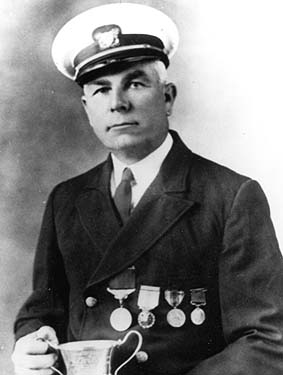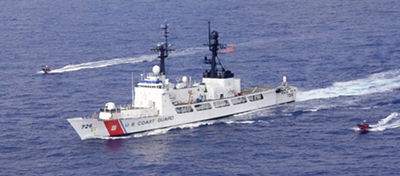25 Aug. 1876–9 Feb. 1938
See also: Mirlo Rescue

John Allen Midgett, Jr., chief warrant officer, U.S. Coast Guard, was born at Chicamacomico (now Rodanthe) of English ancestry. He was the son of Phoebe O'Neal and John Allen Midgett, Sr., officer-in-charge (keeper) of New Inlet Life-Saving Station (formerly Loggerhead Inlet), located between Oregon Inlet and Chicamacomico on North Carolina's Outer Banks. Midgett was reared on Cape Hatteras Island near the famed "graveyard of the Atlantic"—Diamond Shoals—and attended the village school through whatever grades were taught at that time. He acquired the remainder of his formal education in a private academy in Elizabeth City.
Returning to his native community as a very young boy, he grew up strong in stature, absorbing the lore and lure of the sea, knowing no fear of the vast ocean but learning a deep respect for it. With the Midgett life-saving tradition behind him, it is no wonder that he, too, chose the U.S. Life-Saving Service as his life's work, enlisting from North Carolina in 1898 and serving through the merger of the Life-Saving Service with the U.S. Coast Guard until his death. Prior to his service at Chicamacomico Station, he served at the Little Kinnekeet and Gull Shoal stations. After the Mirlo rescue, the U.S. Navy sent him to the Philadelphia Navy Yard, probably to act briefly as a Coast Guard consultant concerning the German submarine activity off the East Coast. This is supposition, since information of that nature is strictly classified.
No man in the U.S. Coast Guard became more widely known than Midgett after his heroism one August afternoon in 1918. Chief Boatswain Midgett, while in charge of Chicamacomico Coast Guard Station, was in command of a lifeboat that went to the aid of the British tanker Mirlo, which had been torpedoed by a German submarine offshore from Midgett's station. The ship's cargo of gasoline and oil spread over ten miles of ocean, burning as it spread. The crew of the stricken tanker abandoned ship in three boats. One capsized as it was being lowered; another was so crowded as to be unmanageable. The daring crew of the Chicamacomico Coast Guard Station and its commanding officer pulled the survivors of the capsized boat from the blazing oil, located and took the other two boats in tow, and landed forty-two men safely ashore through a burning ocean of raging, stormy surf. Midgett's simple sentences, in their brevity, are best captured in his official report of the episode in the Coast Guard annals. This report gives an unforgettable picture of a deed of daring that takes first rank in the saga of the U.S. Coast Guard Service.

In Coast Guard history, one name—Midgett—continually appears. The Midgetts have been labeled "Mighty Men," catalogued and described as legendary, heroic, loyal, proud, and, above all, American. Among them, Chief Warrant Officer Midgett had a profound influence on the Coast Guard's history and was an inspiration to the young boot and old salt alike. On 2 July 1972, to acknowledge the contribution by the famous Outer Banks family and to honor John Allen Midgett, Jr., the North Carolina Navy League Council, the state of North Carolina, and the U.S. Coast Guard proclaimed "Midgett Day." In remembrance of the chief warrant officer, the Coast Guard named its newest cutter Midgett and exhibited the 378-foot ship at Morehead City on Midgett Day. This class of cutter is named after either past secretaries of the Treasury or Coast Guard heroes. The cutter is primarily a search-and-rescue vessel, but it plays an integral part in the Coast Guard's many other roles in navigation, such as serving as a floating landing pad for helicopters and, in time of war, as an antisubmarine vessel.
In December 1920 Midgett received a gold medal for gallantry in lifesaving from the British government and a silver cup from the British Board of Trade. In 1930 he and the members of the Mirlo rescue crew—Zion S. Midgett, Leroy S. Midgett, Arthur V. Midgett, Clarence E. Midgett, and Prochorous O'Neal (married to a Midgett)—were awarded the American Cross of Honor.
John Allen was ambitious and actively interested in politics. An independent by tradition, environment, and conviction—voting for "the man" rather than the party—this brave and modest man had many friends both Democratic and Republican. He was a close friend of Franklin Roosevelt and most of the congressmen during the Roosevelt years; many congressmen left their Washington seats to attend his funeral in Rodanthe in 1938.
Midgett sprang from deeply religious Methodists; he was noted for his honesty, courage, and kindness. Like all the "Mighty Midgetts" before (and after) him, he had a great capacity for taking Life by the scruff of the neck and shaking her into doing his bidding. He advised justly, assisted readily, withstood provocations patiently, defended courageously, and was a friend unchangeably. A leader on his native Cape Hatteras, he took an interest in education and in community improvements such as roads and better transportation on the Outer Banks. He was a Thirty-second-degree, Scottish Rite Mason, with membership in the Wanchese Masonic Lodge.
He married Jazania Spencer Payne of Chicamacomico, and the couple had four children: Nora M. Herbert, Bethany M. Gray, Herbert, and Ellery C. (a captain in the U.S. Navy and later a captain in the U.S. Merchant Marine).
John Allen Midgett, Jr., died a "landsman's" death in the Public Health Hospital at Norfolk, Virginia, as the result of complications suffered in an auto accident during the holidays of Christmas 1937. Had he lived until August 1938, he would have been sixty-three, and that month would have marked the forty-second year of his active service in the Coast Guard. The next year, as a warrant officer, he would have retired, and his period of service would have remained a record for a long while. He, his wife, and their daughter Nora were buried in the Manteo Cemetery on Roanoke Island.